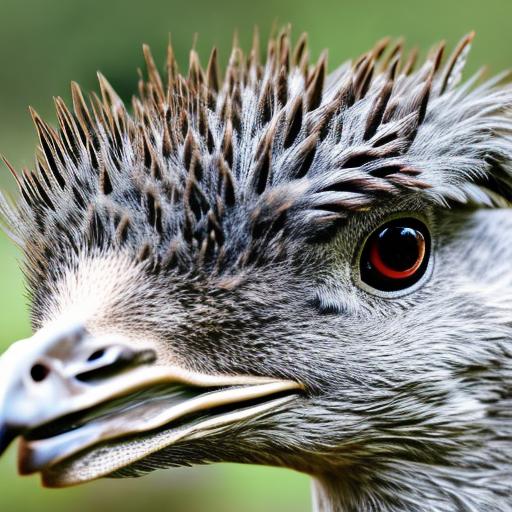The idea of keeping emus and chickens together may seem strange to some, but it is actually possible to successfully raise these two birds in the same environment. This blog post will explore the differences between emus and chickens, the benefits and challenges of keeping them together, housing and feeding requirements, health concerns, social dynamics, and provide tips for success.
Key Takeaways
- Emus and chickens can coexist, but it requires careful planning and management.
- Emus are much larger and stronger than chickens, and have different dietary and housing needs.
- Keeping emus and chickens together can provide benefits such as pest control and increased socialization.
- Potential challenges include aggression, disease transmission, and competition for resources.
- Housing should be spacious and secure, with separate areas for feeding and nesting.
Understanding the Differences Between Emus and Chickens
Emus are significantly larger and more aggressive than chickens. While chickens are typically small and docile, emus can grow up to 6 feet tall and weigh up to 120 pounds. Their size alone can make them intimidating to chickens. Additionally, emus have a different diet than chickens. They are flightless birds that primarily eat plants, fruits, and insects. Chickens, on the other hand, are omnivores that eat a combination of grains, seeds, insects, and small animals.
Another important difference between emus and chickens is their social behavior. Chickens are highly social animals that thrive in groups and need companionship. They establish a pecking order within their flock and rely on each other for protection and social interaction. Emus, on the other hand, are solitary birds that prefer to be alone. They do not form strong social bonds with other birds and may not interact with chickens at all.
The Benefits of Keeping Emus and Chickens Together
Despite their differences, there are several benefits to keeping emus and chickens together. One of the main advantages is mutual protection from predators. Emus are known for their territorial nature and can be aggressive towards potential threats. By keeping emus and chickens together, the emus can help protect the chickens from predators such as foxes or raccoons.
Another benefit is that emus and chickens can share the same living space and resources. This can be particularly advantageous for small-scale farmers or backyard enthusiasts who may have limited space. By housing emus and chickens together, you can maximize the use of your available land and reduce the need for separate enclosures.
Lastly, both emus and chickens can be raised for various purposes such as meat, eggs, and feathers. Emu meat is lean and low in fat, making it a healthy alternative to other meats. Emu eggs are also larger than chicken eggs and can be used in cooking or sold as a specialty item. Additionally, both emus and chickens have feathers that can be used for crafts or sold to artisans.
Potential Challenges of Keeping Emus and Chickens Together
While there are benefits to keeping emus and chickens together, there are also potential challenges that need to be considered. One of the main challenges is the aggression of emus towards chickens, especially during mating season. Emus can become territorial and may attack or injure chickens if they feel threatened. This can result in injury or even death for the chickens.
Another challenge is that emus require more space and specialized housing compared to chickens. Emus need a larger enclosure with high fences to prevent them from escaping. They also require shelter from extreme weather conditions such as heat or cold. Providing adequate housing for both emus and chickens can be costly and time-consuming.
Additionally, emus have different dietary needs than chickens and may compete with them for food. Emus require a higher protein diet compared to chickens, which means they may consume more of the available food resources. This can lead to nutritional deficiencies for the chickens if they are not provided with enough food.
Housing Requirements for Emus and Chickens
When keeping emus and chickens together, it is important to provide appropriate housing for both species. Emus require a larger and more secure enclosure compared to chickens. The enclosure should have high fences that are at least 6 feet tall to prevent emus from escaping. It should also have a solid roof or shelter to protect the birds from extreme weather conditions.
Chickens and emus should have separate nesting areas to ensure their safety and comfort. Chickens prefer to nest in small, enclosed spaces such as nesting boxes. Emus, on the other hand, prefer to nest on the ground in open areas. Providing separate nesting areas will prevent any potential conflicts between the two species.
Feeding Emus and Chickens: Similarities and Differences

Both emus and chickens require a balanced diet of protein, carbohydrates, and vitamins. They should be provided with a combination of commercial feed, fresh fruits and vegetables, and access to insects or small animals. However, there are some differences in their dietary needs.
Emus require a higher protein diet compared to chickens. They need a feed that is specifically formulated for emus, as chicken feed does not provide enough protein for their growth and development. Emus also require additional sources of protein such as insects or small animals.
Health Concerns for Emus and Chickens
Both emus and chickens are susceptible to parasites and diseases. It is important to regularly monitor the health of both species and take appropriate measures to prevent or treat any health issues.
Emus require regular deworming and vaccinations to prevent parasites and diseases. They should be vaccinated against common avian diseases such as Newcastle disease and avian influenza. Regular deworming can help prevent internal parasites that can affect their overall health.
Chickens can carry diseases that are harmful to emus, such as avian influenza or Marek’s disease. It is important to practice good biosecurity measures to prevent the spread of diseases between the two species. This includes keeping the living areas clean, providing separate feeding and watering areas, and regularly disinfecting equipment.
Social Dynamics Between Emus and Chickens
Emus are solitary birds and may not interact with chickens. They do not form strong social bonds with other birds and prefer to be alone. Chickens, on the other hand, are highly social animals that thrive in groups. They establish a pecking order within their flock and rely on each other for protection and social interaction.
Chickens may be intimidated by emus due to their size and aggression. They may avoid the emus and stay away from them. Emus, on the other hand, may become aggressive towards chickens during mating season. It is important to monitor the social dynamics between the two species and intervene if any aggression or bullying occurs.
Tips for Successfully Keeping Emus and Chickens Together
To successfully keep emus and chickens together, it is important to follow these tips:
1. Introduce emus and chickens slowly and carefully. Gradually introduce them to each other’s presence and monitor their interactions closely.
2. Provide separate feeding and nesting areas for emus and chickens. This will prevent any potential conflicts over resources.
3. Monitor the birds for signs of aggression or illness. If any issues arise, separate the birds immediately to prevent injury or the spread of disease.
Is Keeping Emus and Chickens Together Right for You?
Keeping emus and chickens together can be a rewarding experience, but it requires careful planning and management. Consider the benefits and challenges before deciding to keep them together. With proper care and attention, emus and chickens can coexist peacefully in the same environment.
If you’re considering keeping emus with chickens, it’s important to understand the dynamics and requirements of both species. While emus and chickens can coexist in the same environment, there are certain considerations to keep in mind. One crucial aspect is the design and flooring of the chicken coop. To ensure the comfort and safety of both emus and chickens, it’s essential to have a suitable floor for the coop. Poultry Wizard provides a helpful article on the topic, offering insights into different flooring options for chicken coops. Check out their article on choosing the right floor for your chicken coop to create a harmonious living space for your feathered friends.
FAQs
What are emus?
Emus are large, flightless birds native to Australia. They are the second-largest bird in the world, after the ostrich.
Can emus and chickens be kept together?
Yes, emus and chickens can be kept together, but it is not recommended. Emus are much larger and stronger than chickens, and they may accidentally injure or kill them.
What are the risks of keeping emus and chickens together?
The risks of keeping emus and chickens together include injury or death to the chickens, as well as stress and aggression among the birds. Emus may also compete with chickens for food and other resources.
What should be considered before keeping emus and chickens together?
Before keeping emus and chickens together, it is important to consider the size and strength differences between the two birds, as well as their dietary and environmental needs. It is also important to ensure that the birds have enough space to move around and that they are properly supervised.
What are some alternatives to keeping emus and chickens together?
Some alternatives to keeping emus and chickens together include keeping them in separate enclosures or pens, or keeping them in different areas of a larger property. It is also possible to keep other types of birds, such as turkeys or ducks, with chickens instead of emus.
Meet Walter, the feathered-friend fanatic of Florida! Nestled in the sunshine state, Walter struts through life with his feathered companions, clucking his way to happiness. With a coop that’s fancier than a five-star hotel, he’s the Don Juan of the chicken world. When he’s not teaching his hens to do the cha-cha, you’ll find him in a heated debate with his prized rooster, Sir Clucks-a-Lot. Walter’s poultry passion is no yolk; he’s the sunny-side-up guy you never knew you needed in your flock of friends!







